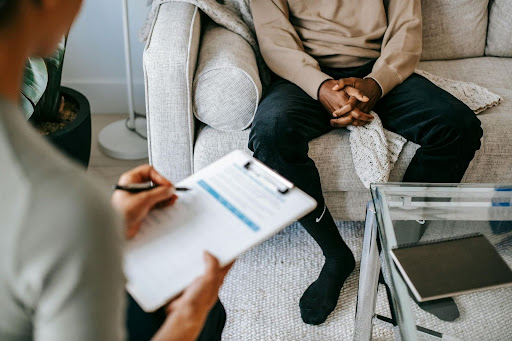
While seeking therapy can seem daunting, there are plenty of local therapists with diverse backgrounds and therapeutic approaches that you can explore. If you’re unsure how to find a therapist, read on—we’ll explore tips and strategies for finding the right fit for you in the Twin Cities metro and beyond!
What Type of Therapist is Right for Me?
Having goals in mind and a clear sense of what you’re looking for can make a big difference as you’re considering working with a therapist. As you start your search, here are a few questions to consider:
- What are my therapy goals and needs? Reflect on your specific mental health concerns, therapy goals, and preferences. Are you looking to talk about something specific? Do you have strong feelings about your potential therapist’s gender or cultural background? Do you want to see a therapist long-term, or do you have a specific concern and need a few sessions for support or problem-solving? Having a clear idea ahead of time can be helpful when evaluating different options!
- Do I want to go alone, in a group, or with others? When you think about therapy, who (if anyone) is with you? Are you looking for individual sessions, group therapy, or family, couples, and marriage counseling? Do you want to utilize a clinic that offers all different options so you can adjust as needed?
- What type of therapy do I want to try? You may have a particular therapy approach in mind, such as Cognitive Behavioral Therapy (CBT), DBT, or eye movement desensitization and reprocessing (EMDR) therapy. It’s also worth considering if you are looking to address specific issues (e.g., trauma, addiction, LGBTQ+ issues, eating disorders, etc.). It can be extra helpful to find a therapist with a background in that area.
- What type of personality works well for me? Establishing a trusting and communicative therapeutic relationship is crucial—you want to feel comfortable during sessions. Often you may need to meet with a therapist for a few sessions before you know if it feels like a “good fit.”
- Do I want to meet in person, virtually, or have the option for both? It’s important that therapy works with your schedule. Some people prefer to have in-person sessions, while others enjoy the convenience of virtual ones. At ACP, we offer both options to make it convenient for you!
How to Find a Therapist
Ultimately, the right therapist is someone who can understand your needs, provide effective support, and empower you to work towards your mental health goals. If you’re not sure where to start, here are a few methods to find a therapist in and around the Twin Cities:
- Search an Online Database
- Referrals: Ask your primary care physician, friends, family, or colleagues for recommendations. Personal referrals can often lead you to therapists who are well-suited to your needs.
- Considering Logistics: Look at location, availability, and insurance coverage. If you have health insurance, your provider can often send over a directory or assist you in finding Minneapolis therapists or other Twin Cities options covered under your plan. ACP is in-network with most insurance payers.
- Get Started: Schedule an initial consultation to figure out if they’re a good fit! During that first meeting, see how you relate to their communication style, empathy, and cultural sensitivity. It’s important to feel comfortable and supported in your therapeutic relationship, so if something doesn’t feel right, don’t hesitate to explore other options.
Finally, remember that finding the right therapist is a journey. Trust the process and be patient with yourself. You may need to try a few therapists before you find the one that works for you.
Common Therapist Licenses Acronyms (And What They Mean)
In the United States, therapists typically hold one or more of the following licenses, depending on their area of expertise and where they practice:
- Licensed Professional Clinical Counselor (LPCC): LPCCs can assess and diagnose mental health conditions. They can also provide counseling and therapy services to individuals, couples, families, and groups. They typically hold a master’s degree in counseling or a related field, have completed postgraduate supervised clinical experience, and passed the required examination.
- Licensed Independent Clinical Social Worker (LICSW): LICSWs can diagnose and assess mental health conditions as well as provide therapy and support services to individuals, families, and communities. They hold a master’s degree in social work, complete supervised clinical experience, including internships and postgraduate training, and pass the licensing examination.
- Licensed Marriage and Family Therapist (LMFT): LMFTs specialize in therapy for couples and families, addressing relationship issues and family dynamics. These providers can also diagnose and assess mental health conditions. They hold a master’s degree in marriage and family therapy or a related field and have completed postgraduate supervised clinical training.
- Licensed Psychologist (LP, Ph.D., or Psy.D.): Psychologists are trained to assess and treat mental health issues through various therapeutic approaches. They hold a doctoral degree (Ph.D. or Psy.D.) in psychology and have completed supervised clinical experience, including an internship and postdoctoral training.
Some therapists may also hold certifications in specific treatment modalities or specialties, which can further demonstrate their expertise in certain practice areas.
Turn to ACP for Your Mental Health Needs
Established in 1980, ACP has a long-standing reputation for excellence in providing evidence-based, compassionate care to individuals, couples, and families. With multiple locations across the Twin Cities metro area and western Wisconsin, we make it convenient for individuals to access care close to home or work. Additionally, we accept most insurance plans, making therapy more accessible and affordable for many individuals.
With an experienced and compassionate team, our Minneapolis therapists offer a range of specialty areas, including anxiety disorders, mood disorders, trauma, LGBTQ+ issues, and more. Whether you’re switching therapists or trying therapy for the first time, we’d love to meet you. Request an initial consultation by filling out the form below. Let’s start prioritizing your mental health!

